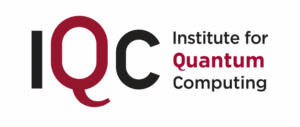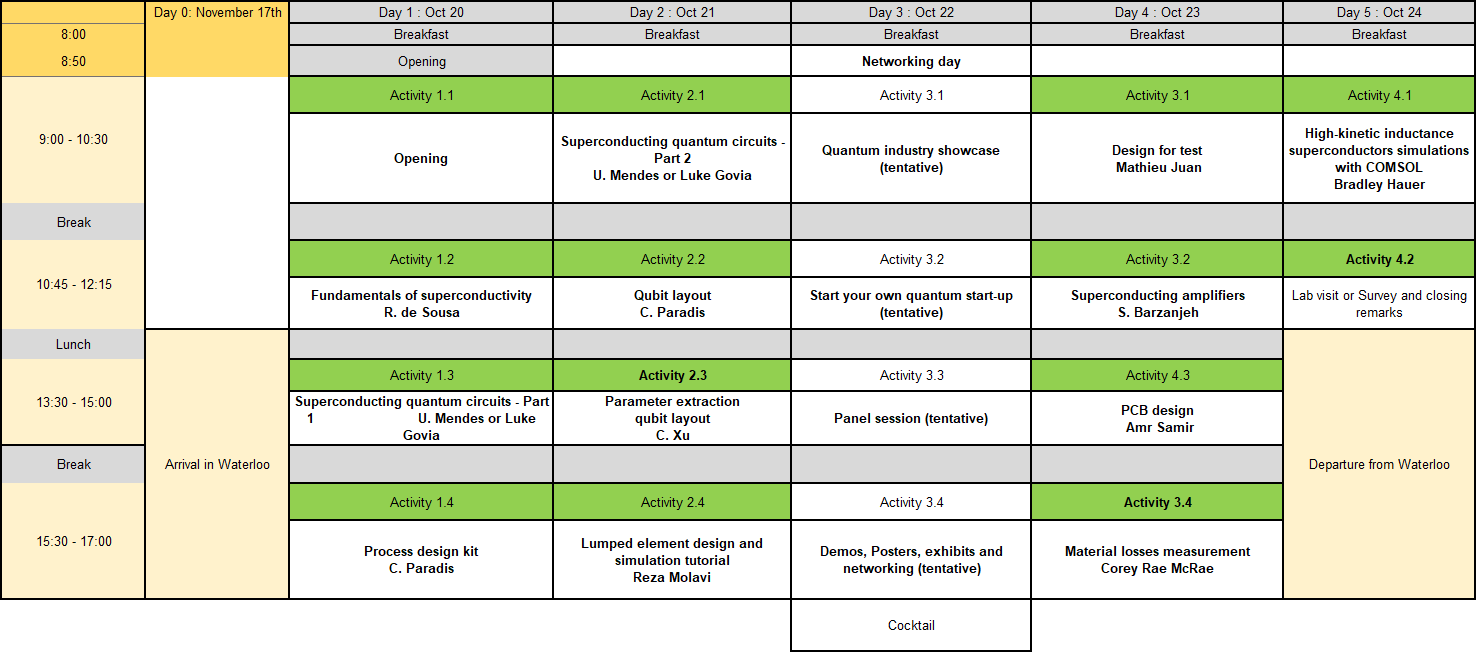Important Dates:
- Registration deadline: October 10, 2025
- NDA deadline: October 10, 2025
- Device design submission deadline: February 1, 2026
- Device design presentation deadline: March 1, 2026
Co-hosted with



A growing number of Canadian companies (i.e., Qubic, Xanadu, Nord Quantique, DWave, Anyon Systems) are now building quantum computers based on superconducting technology, requiring a combination of components such as quantum bits, couplers, and control and readout lines in a single chip. A local start-up like Red Blue Quantum, based in Waterloo, is providing qubit and superconducting circuit fabrication services to the ecosystem, and its founders have been involved as instructors, participants, or advisers in this event in previous editions. At least one company, Qubic Technologies, is leveraging the technology for sensing, transmitting and receiving applications, making its mark in the field. All these require an understanding of the hardware they rely upon. A small design or fabrication error may lead to a complete failure of a quantum-computer chip or sensor, wasting development time and resources. Therefore, the talent developing these components must master fundamental concepts of physics (quantum mechanics and superconductivity) and state-of-the-art design and simulation tools and techniques to fabricate working devices. Additionally, earlier established companies, including Keysight, Siemens, and Cadence, are opening quantum divisions and providing supporting elements such as tools and instrumentations to the quantum ecosystem. And they can use events such as this one to scope out the requirements for their products. Many other companies or organizations focusing on quantum computing can benefit from a better understanding of the issues faced by the hardware in reproducing the quantum states upon which their applications and algorithms are built.
To train highly qualified personnel to develop state-of-the-art quantum computers, CMC Microsystems is joining forces with the Institute for Quantum Computing/University of Waterloo, Institut quantique, University of Victoria, and University of British Columbia to deliver the 5th edition of the “Build your Own Superconducting Quantum Device Workshop”. The workshop will provide a training experience for 50 participants from industry, as well as Canadian and foreign universities, with relevant science or engineering backgrounds.
The workshop will teach participants how to design, simulate, fabricate, and test their superconducting circuits. It will cover the fundamentals of superconductors and Josephson junctions, and how to design circuits such as resonators and qubits. Trainees will brainstorm device ideas with leading Canadian universities and industry researchers. They will use CMC-provided CAD tools to design, simulate, and submit devices for fabrication. Most trainees will test their chips at their home institution.
During the workshop, participants will have the opportunity to attend the Quantum Networking Day. Moreover, attendees are encouraged to participate in the Superconducting Quantum Device Design Awards (See details below). Don’t miss CMC BasecampTM Build Your Own Superconducting Quantum Device workshop, which will allow you to learn why superconducting devices are at the heart of today’s commercial quantum computers such as those of Nord Quantique, Anyon Systems, D-Wave, and IBM.
Superconducting Quantum Device Design Awards
Participants are encouraged to participate in a Device Design Award (a virtual event) in March 2026. The best design ideas will be awarded* for the fabrication of their devices.
Eligibility criteria:
- Attend the in-person workshop.
- Be enrolled in graduate studies in Canada.
- Submit the design layout file for evaluation during the Device Design Award.
- Present their device ideas to a panel of experts at the Device Design Award event.
- Agree to submit a device test report 4 to 6 months after receiving the fabricated device.
*A limited number of awards are available.
Quantum Networking Day
The Quantum Networking Day, a partnership between CMC Microsystems and the Institute for Quantum Computing (IQC), will take place alongside the workshop on October 22. This one-day event will highlight Ontario and Canada’s quantum ecosystem and bring together industry, academic experts, and organizations that support the quantum ecosystem.
The event will have panels on various topics, such as:
- How to create your quantum start-up.
- Careers in the quantum industry for scientists and non-scientists.
- Challenges and opportunities in the field of superconducting quantum research.
- Academia to industry transition.
- Quantum industry and organizations showcase.
- Plenty of opportunities to network with industry leaders, academic experts and other participants.
This event is open to a broader audience than the workshop. For more details, see the networking event webpage.
Important Notes:
- The workshop has a limited space for 50 participants.
- This event will be held in English.
- If you are awarded the fabrication of your device, you may be required to complete a Non-Disclosure Agreement and export control questionnaires. You will be contacted by Charles Paradis and Sarah Neville to get a copy of the questionnaires.
- Course participants will have access to other proprietary and confidential information during the course. Each participant is required to sign an Access to Intellectual Property & Non-Disclosure Agreement. Participants should submit a signed agreement to Sarah Neville before October 1, 2025.
Target Audience
Workshop Details
The workshop’s daily schedule is divided as follows: four 1.5-hour sessions, two 30-minute coffee breaks, and a 1-hour and 15-minute lunch break. On Wednesday, October 22, the Networking Day events will replace the usual schedule and will be followed by a cocktail reception in the evening.
See the event schedule below (click for enlarged view).
Speakers/Instructors
- Prof. Shabir Barzanjeh – University of Calgary
- Prof. Rogério de Sousa – Quantum BC, University of Victoria
- Ph.D. Udson Mendes – CMC Microsystems
- MSc. Charles Paradis – CMC Microsystems
- Ph.D. Amr Samir – CMC Microsystems
- Ph.D. Luke Govia – CMC Microsystems
- Ph.D Reza Molavi – Google Quantum AI
- Prof. Bradley Hauer – Institute for Quantum Computing, University of Waterloo
- Prof. Mathieu Juan – Institut Quantique, Université de Sherbrooke
- Prof. Corey Rae McRae – University of Colorado Boulder
- Ph.D Christopher Xu – University of Waterloo
Scientific Committee
- Prof. Shabir Barzanjeh – University of Calgary
- Prof. Rogério de Sousa – Quantum BC, University of Victoria
- Prof. Max Hofheinz – Institut Quantique, Université de Sherbrooke
- Prof. Mathieu Juan – Institut Quantique, Université de Sherbrooke
- Prof. Adrian Lupascu – Institute for Quantum Computing, University of Waterloo
- Dr. Udson Mendes – CMC Microsystems
Accommodations and Travel
- Participants are invited to stay at the Crowne Plaza hotel in Kitchener-Waterloo, with a direct LTR line to the university available right in front of the hotel.
- The rate is $159 per night (plus taxes) for a dual-occupancy room. Participants are encouraged to pair up to save on lodging costs. In the case where you cannot find a colleague to share the room, please contact us (quantum@cmc.ca), and we will help you find someone.
- Cancellations or modifications are permitted up to 72 hours prior to arrival.
- All travel and lodging costs are the responsibility of the attendees.




